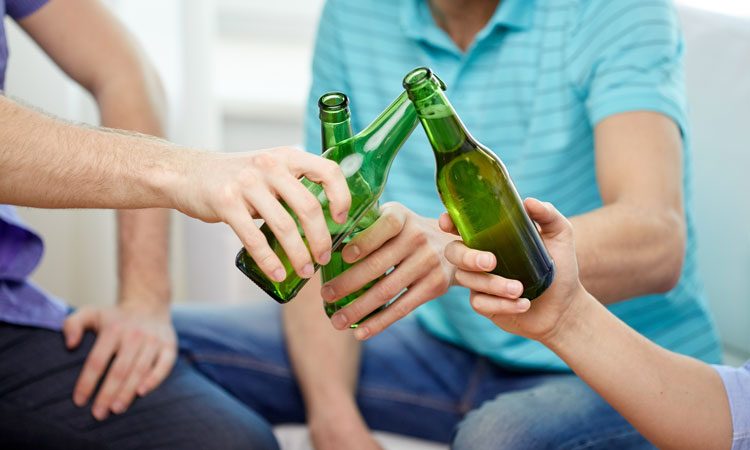Just one glass could age your brain…
- Like
- Digg
- Del
- Tumblr
- VKontakte
- Buffer
- Love This
- Odnoklassniki
- Meneame
- Blogger
- Amazon
- Yahoo Mail
- Gmail
- AOL
- Newsvine
- HackerNews
- Evernote
- MySpace
- Mail.ru
- Viadeo
- Line
- Comments
- Yummly
- SMS
- Viber
- Telegram
- Subscribe
- Skype
- Facebook Messenger
- Kakao
- LiveJournal
- Yammer
- Edgar
- Fintel
- Mix
- Instapaper
- Copy Link
Posted: 9 March 2022 | Abi Sritharan (New Food) | No comments yet
A new research study has found that consuming just one to two alcoholic drinks a day can cause serious cognitive issues.


New data found that drinking one to two alcoholic beverages a day was linked with changes in the brain equivalent to ageing two years. And heavier drinking was associated with an even greater toll.
Using UK Biobank, the researchers from the University of Pennsylvania gathered information from more than 36,000 adults in the UK to study how the brain can be affected by alcohol consumption. The research, published in Nature Communications, found that alcohol consumption – even at levels most would consider modest – may carry risks to the brain, including reductions in overall brain volume.
The link grew stronger the greater the level of alcohol consumption, the researchers claimed. They shared the following example: in 50-year-olds, as average drinking among individuals increased from one alcohol unit (about half a beer) a day to two units (a pint of beer or a glass of wine) there were associated changes in the brain equivalent to ageing two years. Going from two to three alcohol units at the same age was like ageing three and a half years.
“The fact that we have such a large sample size allows us to find subtle patterns, even between drinking the equivalent of half a beer and one beer a day,” said Gideon Nave, a corresponding author on the study and faculty member at Penn’s Wharton School.
A great deal of research has examined the link between drinking and brain health, with ambiguous results, the researchers pointed out. While substantial evidence exists that heavy drinking causes changes in brain structure, including strong reductions in grey and white matter across the brain, other studies have suggested that moderate levels of alcohol consumption may not have an impact, or even that light drinking could benefit the brain in older people. These earlier investigations, however, lacked the power of large datasets, the researchers argue.
“These findings contrast with scientific and governmental guidelines on safe drinking limits,” said Henry Kranzler, one of the authors of the study and director of the Penn Center for Studies of Addiction. “For example, although the National Institute on Alcohol Abuse and Alcoholism recommends that women consume an average of no more than one drink per day, recommended limits for men are twice that, an amount that exceeds the consumption level associated in the study with decreased brain volume.”
“Having this dataset is like having a microscope or a telescope with a more powerful lens,” added Nave. “You get a better resolution and start seeing patterns and associations you couldn’t before.”
The authors explained that to gain an understanding of possible connections between drinking and the brain, it was critical to consider certain variables, such as age, sex, height and more, that could cloud the relationship.
When the researchers grouped the participants by average alcohol consumption levels, a small but apparent pattern emerged: the grey and white matter volume that might otherwise be predicted by the individual’s other characteristics was reduced.
“There is some evidence that the effect of drinking on the brain is exponential,” said Remi Daviet, another co-author of the study, “so, one additional drink in a day could have more of an impact than any of the previous drinks that day. That means that cutting back on that final drink of the night might have a big effect in terms of brain ageing.”
Even when removing the heavy drinkers from the analyses, the researchers found associations remained. The lower brain volume was also not localised to any one brain region.
To give a sense of the impact, the researchers compared the reductions in brain size linked with drinking to those that occur with ageing. Based on their modelling, each additional alcohol unit consumed per day was reflected in a greater ageing effect in the brain. While going from zero to a daily average of one alcohol unit was associated with the equivalent of a half a year of ageing, the difference between zero and four drinks was more than 10 years.
The participants in this study were part of the UK Biobank, and the researchers of this study hope to use this again in the future, alongside other large datasets, to help answer additional questions related to alcohol consumption.
Related topics
Related organisations
National Institute on Alcohol Abuse and Alcoholism, University of Pennsylvania








